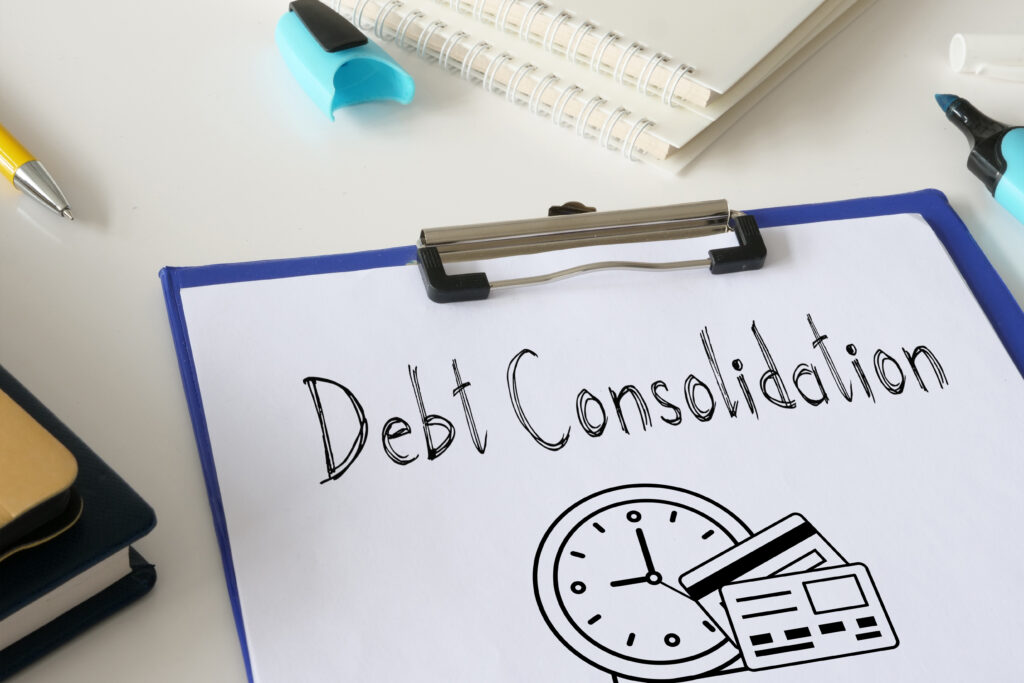If you have a lot of debt from things like car loans, personal loans, and credit cards, you’re not alone. Many Americans have the same money problems. In fact, Americans currently owe nearly $18 trillion in debt, and the average American family owes over $100,000.
There are lots of different ways that people can handle their debts and reach their money goals. Debt consolidation is one popular option. People can use loan consolidation to help pay down credit card balances, car loans, personal loans, and other types of debt.
So, what does it mean to consolidate a loan? Let’s take a look.
What Is Debt Consolidation?
Debt consolidation is when you combine many debts into one new loan. This new loan often has better terms, like a lower interest rate or a longer amount of time to pay it back. Ideally, it has both.
Loan consolidation makes it easier to pay off your debts by changing many payments into one. It also usually makes your monthly payment lower. As you might imagine, this makes it a very popular debt relief option.
A lot of lenders now offer loans specifically for debt consolidation. Balance transfer credit cards are often used to combine many credit card debts into one account.
Debt consolidation is most often used for credit card debt, but it can also be used for other kinds of debts. For example, you can use auto loan consolidation to combine two or more car loans into one new loan. This can be very helpful if your current car loans have interest rates or payment terms that are hard to manage.
When Debt Consolidation Doesn’t Work
Debt consolidation can be a good tool for managing loans and credit card debt, but it isn’t right for everyone. If you have a bad credit score, you might not be able to get a debt consolidation loan with a low enough interest rate. There’s a chance you might not be able to get a new loan at all.
If your debt problems come from spending more money than you make, debt consolidation won’t fix the root problem. It’s a good way to get out of old debt, but it won’t prevent you from taking on new debt in the meantime.
Alternatives to Debt Consolidation
Luckily, there are other ways to deal with debt if debt consolidation isn’t right for you. For example, credit counselors can help you organize your debts and control your spending. Credit counseling services from non-profit groups are often cheap or even free.
Debt settlement services, like those from SmartSpending, can also be a good choice. This is especially true if your current debts are so high that you don’t think you could ever pay them all back. Finally, in extreme cases, bankruptcy might be something to think about.
Wrapping Up
So, what does it mean to consolidate a loan? It means taking many loans and debts and putting them into one new loan. This can make debt much simpler to manage and easier to pay off.
By consolidating loans, especially those with high interest rates, you can make big steps toward fixing your finances. If you’re ready to take control of your debt, contact us today to explore your options. It’s never too late to rewrite your financial story.
Frequently Asked Questions
The content provided is intended for informational purposes only. Estimates or statements contained within may be based on prior results or from third parties. The views expressed in these materials are those of the author and may not reflect the view of SmartSpending. We make no guarantees that the information contained on this site will be accurate or applicable and results may vary depending on individual situations. Contact a financial and/or tax professional regarding your specific financial and tax situation. Please visit our terms of service for full terms governing the use this site.

